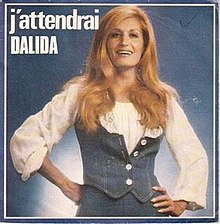J'attendrai
| J'attendrai | ||||
|---|---|---|---|---|
 |
||||
| Studio album by Dalida | ||||
| Released | 1975 | |||
| Recorded | 1973-1975 | |||
| Genre | World music, Pop music, Adult contemporary music | |||
| Label | Orlando International Shows, Sonopresse | |||
| Dalida chronology | ||||
|
||||
"J'attendrai" (French for "I will wait") is a popular French song first recorded by Rina Ketty in 1938. It became the big French song during World War II; a counterpart to Lale Andersen's Lili Marleen in Germany and Vera Lynn's We'll Meet Again in Britain.
"J'attendrai" is actually a French version of the Italian song "Tornerai" (Italian for "You Will Return") composed by Dino Olivieri (music) and Nino Rastelli (lyrics) in 1936, said to be inspired from the Humming Chorus of Puccini's Opera "Madame Butterfly". It was first recorded in 1937 by both Carlo Buti and Trio Lescano (accompanied by the Italian jazz quartet Quartetto Jazz Funaro), and become a huge hit in Italy.
The French lyrics were written by Louis Poterat, and "J'attendrai" became an instant success. Rina Ketty's version was followed the same year by one of Belgian chanteuse Anne Clercy, and both Tino Rossi and Jean Sablon recorded it in 1939. When France was occupied in 1940, it quickly became the big French war song, with the love song's title being interpreted as meaning waiting for peace and/or liberation.
The French version of this Italian song became so well known across Europe that it was often called "J'attendrai" even when recorded instrumentally, such the two versions recorded by Django Reinhardt and Stéphane Grappelli in 1938, or referred to as the original source when sung in other languages, such as Richard Tauber's British "Au revoir" (1945, with lyrics by Bruce Sievier) and Bing Crosby's and Hildegarde's American "I’ll Be Yours" (both 1945 with lyrics by Anna Sosenko).
...
Wikipedia
